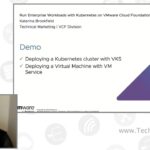|
|

Katarina Brookfield and Vincent Riccio presented for VMware by Broadcom at CFD21 |
This video is part of the appearance, “VMware Presents at Cloud Field Day 21“. It was recorded as part of Cloud Field Day 21 at 8:00-11:30 on October 24, 2024.
Watch on YouTube
Watch on Vimeo
VMware Cloud Foundation allows customers to run any modern workload alongside any traditional workload, all on the same platform, using a unified set of management tools. In short demos we’ll walk through capabilities of main services, such as VM Service and vSphere Kubernetes Service (VKS), and demonstrate their seamless integration with underlying Network and Storage infrastructure to provide Load-balancing and Persistent Volumes for our workloads. Later we’ll discuss how VCF Automation takes the consumption experience to the next level with the introduction of Blueprints and Self-Service Catalog. In addition we will discuss governance and policies, lifecycle management and ongoing cost visibility of your workloads and applications.
VMware Cloud Foundation (VCF) offers a unified platform for running both traditional and modern workloads, such as virtual machines (VMs) and Kubernetes clusters, using a consistent set of management tools. The platform integrates compute, storage, and networking resources, allowing users to deploy workloads in a seamless manner. VCF’s declarative API, called the VCF Supervisor, enables the deployment of Kubernetes clusters and VMs, providing resource isolation through vSphere namespaces. This allows administrators to set governance policies, such as access control and resource allocation, while also offering additional services like private container image registries and ingress controllers. The platform supports hybrid applications, where both containers and VMs can coexist, and provides a seamless experience for managing these workloads using the same tools. The demo showcased how easy it is to deploy Kubernetes clusters and VMs using VCF’s interface, with options for customizing configurations, such as networking overlays, storage policies, and VM classes.
In addition to workload deployment, VCF also offers automation capabilities through its VCF Automation tool, which allows users to consume and deploy services across private cloud environments. The tool supports templates and self-service catalogs, enabling users to deploy hybrid applications that combine VMs and containers. The automation tool integrates with various services, such as load balancers and persistent volumes, and provides governance features like lease policies to manage resource usage. The demo highlighted how users can create YAML-based templates to automate the deployment of Kubernetes clusters, VMs, and other services, while also offering flexibility for DevOps teams to manage infrastructure as code. Overall, VCF provides a comprehensive solution for managing both traditional and modern workloads, with a focus on automation, governance, and seamless integration across the infrastructure stack.
Personnel: Katarina Brookfield, Vincent Riccio









